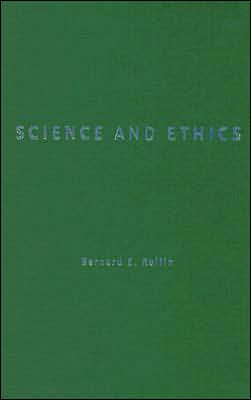

 |

|

The average rating for Science and Ethics based on 2 reviews is 5 stars.
Review # 1 was written on 2013-03-27 00:00:00 Ken Lenart Ken LenartIn the first Bernard Rollin book I read, Putting the Horse before Descartes, the author showed himself to be a champion for the humane treatment of animals, as well as a champion in using a philosophical education to move people and to change institutions. I read Science and Ethics because I wanted a more theoretical understanding of Rollin's views and of his ideas on philosophy's role in society. I was not disappointed. As someone who has taught introductions to philosophy, I found a fresh and idiosyncratic approach, which was inspiring while being both down-to-earth and rigorous. Much of the book is taken up with criticizing the "ideology" of science, the unjustified assumptions which distort the practice of science, such as that science is "value-free," or that science investigates only "objective" phenomena. These topics are fascinating and important, but I was more interested in how Rollin regards ethics, so I concentrated on his chapter, "What is Ethics?" Rollin describes two kinds of ethics, ethics1 and ethics2, or we might say morals and ethics. The first kind, ethics1 (or morals) are the rules which we have been taught to live by and which we have tacitly accepted as the way to make society work. Don't lie, don't cheat, don't steal, etc. are necessary rules if we are to communicate or to work with each other. These are embodied, more or less, in our laws, although at the boundaries we may argue about what makes a good law. Rollin argues that ethics1 is objective, not subjective, in the sense that it is acknowledged by all societal observers. If you rob a bank, it is no defense to say, "In my subjective opinion that is not wrong." Ethics2 (the classroom variety of ethics) is the discussion of the justification and consistency of ethics1. We can argue that some ethical rule is inconsistent with other rules we hold, or that a given rule does not serve the interests of society well. There are classic methods for justifying rules, teleological approaches such as utilitarianism, the greatest good for the greatest number, and deontological approaches such as liberal egalitarianism, equal treatment under the law. But in any event, the rules of ethics1 are what already exist in society, and we can criticize them or change them with ethics2. What seems like a fresh approach to me is to think of ethics (ethics1 or morals) as a phenomenon of our culture which already exists and can be described almost as an anthropologist might see it, rather than as an abstraction which has a claim on us from outside of the everyday world. Ethics2 then becomes the criticism and improvement of that feature of our culture. The distinction reminds me of a similar distinction made by P.F. Strawson between descriptive ontology and revisionary ontology. Descriptive ontology describes what people actually think are in the world (material objects, persons, numbers, etc.), while revisionary ontology tries to improve on the way we think of these things. One is a descriptive activity and the other is an explanatory activity. Rollin goes back to Plato as the first precedent for examining how we are to lead our lives. Every rule may be criticized, and the strength of a rule is whether it can withstand the criticisms made of it, whether it is consistent with the other things we believe, and whether its practice can be part of a functioning society. But even as we examine and criticize the rules, we also take them for granted and respect them, as Socrates accepted the judgment of Athens. Rollin's insight in using ethics to fight for the welfare of animals is to use "ethical judo" instead of "ethical sumo." Instead of directly opposing his adversaries, he starts out by understanding the ethical rules by which his adversaries are guided. For farmers or veterinarians or anyone who works with animals, there is usually some caring about animals. He can then appeal to the ethical commitments of his interlocutors to argue against practices which gratuitously cause pain or suffering to animals. He likens this to the Socratic method of "reminding" the listener of what he already knows, rather than of imparting or imposing new knowledge. However he does it, Bernard Rollin can often be a modern-day Socrates. |
Review # 2 was written on 2017-12-13 00:00:00 Craig Miller Craig MillerLove, so much good discussion |
CAN'T FIND WHAT YOU'RE LOOKING FOR? CLICK HERE!!!